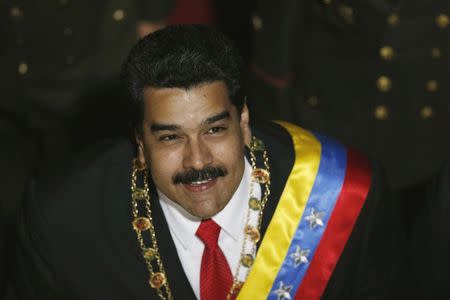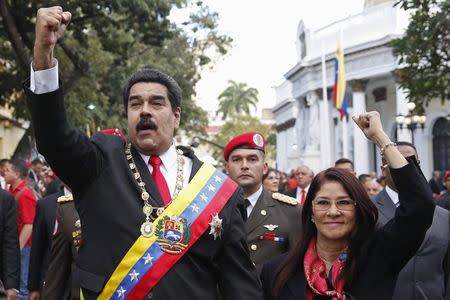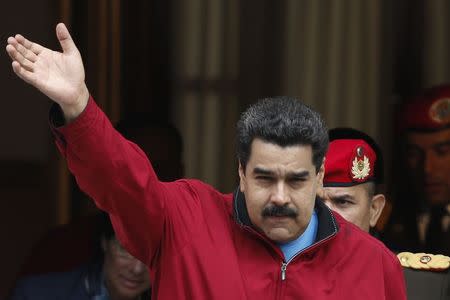Venezuela's economy shrunk 2.8 percent in 2014: Maduro
By Andrew Cawthorne and Alexandra Ulmer
CARACAS (Reuters) - OPEC member Venezuela's recession-hit economy shrunk 2.8 percent in 2014 while inflation topped 64 percent, President Nicolas Maduro said on Wednesday, in almost certainly the worst performance in Latin America.
In his annual address to parliament, the 52-year-old successor to Hugo Chavez blamed political foes and an "economic war" for Venezuela's dismal data.
"In 2014, we again faced the script of destabilization and violence," Maduro said, referring to four months of protests that caused major disruption and killed 43 people, including demonstrators, government supporters and security officials.
Opponents say 15 years of misguided socialist policies and corruption since Chavez took power have wrecked Venezuela's economy and heaped suffering on its 30 million inhabitants who are facing unprecedented shortages of basic products.
"They've destroyed production," opposition leader Henrique Capriles tweeted while Maduro spoke. "That's the cause of the queues, not the lies they're telling."
Maduro had promised to make announcements on economic changes during his address, and economists have speculated he may decide to devalue the local bolivar currency.
They expect a reduction or suspension of dollar sales at the strongest rate of the three-tier currency controls, currently 6.3 bolivars, to help state coffers amid tumbling oil revenues and black market price for the greenback 27 times higher.
Maduro said on Wednesday Venezuela's crude, which trades at a discount to other benchmarks due to its greater heavy-oil content, was at $38 a barrel - compared with $99 in June.
PARLIAMENTARY VOTE LOOMS
With his popularity falling and a national parliamentary election looming later in the year, Maduro has so far steered clear of taking socially risky measures, including increasing the price of the world's cheapest gasoline.
Amid the highest inflation in the Americas, the government still maintains popular Chavez-era welfare programs, such as subsidized food and free health clinics, that benefit millions.
And Maduro said unemployment was at a new low of 5.5 percent "despite the economic contraction of 2.8 percent and a very high inflation, above 64 percent" last year.
According to U.N. estimates, Argentina is the only other country in Latin America whose economy was seen contracting last year, though by less than Venezuela.
In one of the grimmest forecasts yet, the IMF estimated earlier on Wednesday that Venezuela's economy will contract 7 percent this year, in part due to the oil slump, according to a blog post by its western hemisphere department director Alejandro Werner.
Venezuela's opposition coalition called on people to bang pots and pans in a traditional form of protest during Maduro's speech. That could be heard in some neighborhoods of Caracas, though not as loud as on occasions last year.
The Democratic Unity coalition has also called for a peaceful protest march on Saturday.
Government supporters are to rally on Friday.
Both sides are seeking a show of support amid a vicious blame-game over economic shortages and the National Assembly elections.
Even though his popularity has dropped to 22 percent, according to one leading pollster, Maduro predicted his ruling Socialist Party would win by 10 percentage points.
Investors and analysts were waiting for Maduro's speech to hear details of potential financial deals and any mention of OPEC policy following his visits this month to China, Saudi Arabia, Iran, Russia, Algeria, and Qatar.
Flanked by a giant photo of Chavez twice his own size, Maduro announced a new crackdown on distributors whom officials accuse of deliberately hoarding products in Venezuela.
Maduro confidently predicted, "2015 will be the year of victory and economic rebirth," even as scores of opponents took to Twitter across Venezuela predicting he would not last the year in power and his "Chavismo" movement was in its dying days.
(Additional reporting by Diego Ore, Eyanir Chinea; Editing by Andrew Cawthorne, David Gregorio and Bernard Orr)




